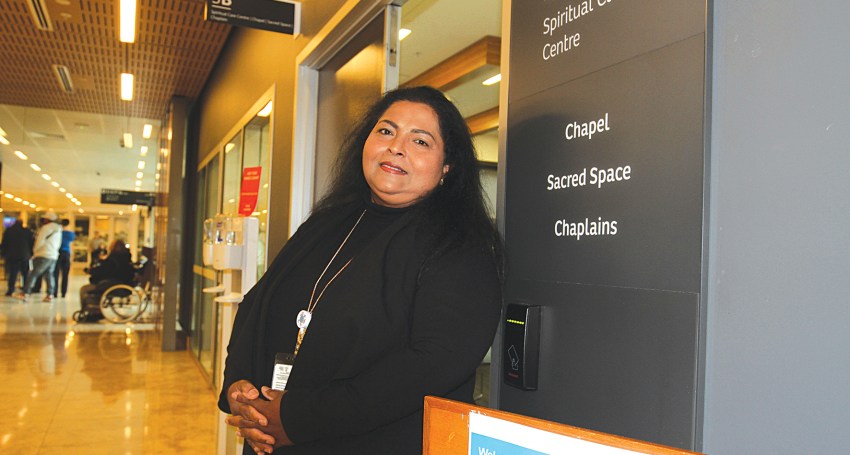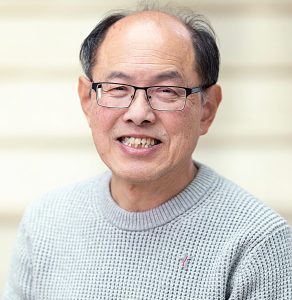A pastoral heart just the remedy
People
Whether they know you or not, sometimes it can be just two or three minutes before a patient begins to share their deepest feelings and emotions. That’s the experience of chaplain Nadee Fernando since she began serving in hospitals in February.

Nadee says now and again a patient may be unable to speak or is wearing a mask but will express their emotions by holding out a hand or making eye contact to express their emotions. Tears, even, are a way of communicating.
As with other chaplains, Nadee, who works at the Royal Adelaide, Queen Elizabeth, Repatriation and Hampstead hospitals, can spend up to 40 minutes at a time with a patient or relative and will often talk to 15 people in a single shift.
Advertisement
But she is yet to come home exhausted, describing her work as “a vocation” rather than a job.
“I still have a lot of energy, I think the Holy Spirit provides me with it. I don’t feel tired and I want to do more. I think it’s because I’m doing it with my heart,” she says.
It was difficult to stem the communal enthusiasm when
The Southern Cross spoke to Nadee and fellow Archdiocesan chaplains Anthony Hill and Tee Ping Koh.
There is a mandatory training program – the Clinical Pastoral Education (CPE) – for all hospital and prison chaplains but the requirements go far beyond paper qualification and sound theological understanding.
Life experience and the ability to listen is a must, says Annette Heinemann, manager of Hospital and Prison Chaplains at the Adelaide Archdiocese.
“Most importantly, people need to know themselves well because it’s only then, that we’re able to be present to someone else,” she says.
“If we don’t know ourselves and we are full of our own stuff, we can’t listen because patients and families would trigger our own emotions from our own experiences. And it’s learning what to do with that.”
Tellingly, the three chaplains have very different but complementary backgrounds.
Nadee has spent 18 years volunteering in her parish and worked in aged care for five years as a cook. Every experience counts.
“And I was a church musician, I always used to sing along and play for residents in my lunch breaks,” she says.

Deacon Tee Ping Koh
Tee Ping, who works at Noarlunga and Repatriation hospitals, is a retired pharmacist.
He is also an innovator and when a pharmacist organised public lectures in primary healthcare, bringing professors and experts to talk to parents about asthma. The findings, which led to an award as pharmacy manager of the year, were secondary to the benefits of hearing parents’ concerns and giving them comfort.
“It’s chaplaincy in a heart-to-heart context,” Tee Ping says.
Advertisement
Tee Ping clearly reads people well. He is not a joke teller but connecting through a general awareness of others is key.
“I sort of stereotype to a degree. If I see an Italian person, I’d probably work out he’s got a big patch of tomatoes in the back garden and (might) talk about that. I tend to pick what is in the room. I observe and see what I can draw and use that as a starting point.”
Knowing the boundaries is paramount and Tee Ping tells a story about a man who’d been in hospital for a long time.
“I got to know him very well. Then he started telling everything about his life story, about how he fell in love and how he abandoned the wife. One day I walk in and I say, ‘Oh, you look happy today?’
“He said, ‘Well, you won’t believe what happened? My ex-wife came back’.”
When the patient told Tee Ping his ex-wife was organising a new will, he had to tell him “this is my boundary – I will listen to you but I will not get engaged”.
“I have to be very careful about that sort of thing,” he says.

Deacon Anthony Hill with patient Virginia
Anthony has worked in public and private hospitals in New South Wales and South Australia and now covers Lyell McEwin and Modbury hospitals. All have very different realities, he says. Public hospitals can have high numbers of patients ready for discharge but some have nowhere safe to go and remain in hospital.
“We’ve had a dementia patient stay in one of the hospitals for over two years because he had nowhere to go,” Anthony says.
As well as gregarious and amenable, Anthony is a physically capable man but still tempers have flared occasionally.
“You’re dealing with people with dementia, so you need to be aware. I popped in to see a lady that had vascular dementia and she hit me across the arms,” he says with no resentment.
Challenges are everywhere and are dealt with in a very calm and respectful manner by the chaplains. Often, and obviously, they meet people in a high state of spiritual anxiety or distress.
“I can get people who want to engage and open their hearts to their problems or will cry at the thought of knowing that they are loved by the Church or that a chaplain is supporting them,” he says.
Hours are long, between 8am to 9pm, with an on-call priest taking over for the last rites if need be.
Anthony says while occasionally he might want some down time after a long day, being tired is not part of the job.
“In the then Ministry Formation Program, we were always taught to remember that we are being invited by God to participate in that work,” he says.
“It talks about walking humbly with God. if I let my ego get too much ahead of me, I am not as good a chaplain as if I am walking more spiritually in tune.
“It means that when I go home, I can let that go and say I am back to Anthony the person.”
It is an outlook endorsed by Annette.
“There is a saying in chaplaincy that God was active long before we came and will continue to be active in a person’s life long after we have gone. It gives that recognition that we are just there for that moment in time,” she says.
“Sometimes it can be a long journey or short, even for those without faith and we do minister to all people…there is the belief that God is present amongst us all regardless.”
Regular notes are provided to clinicians by the chaplains to ensure best practice and that everyone is in the loop.
Ultimately, Annette says it comes down to having good people who put the emphasis on classic spiritual formation and the human touch.
“Good pastoral care is responding with a pastoral heart.”











